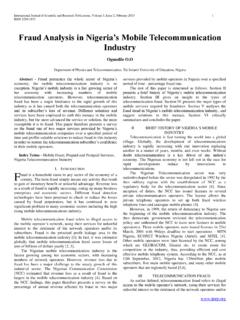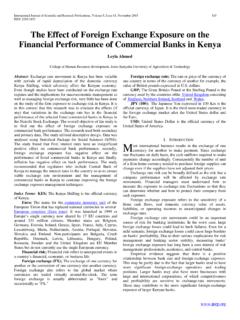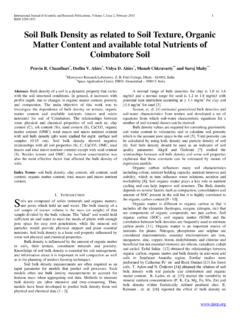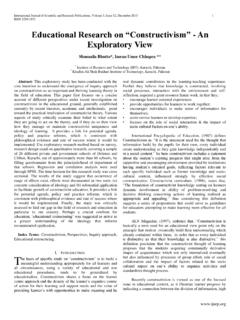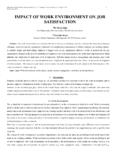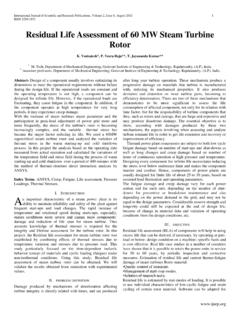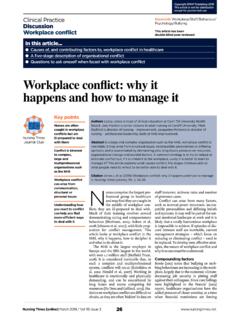Transcription of The importance of Supervisor Support for Employees ...
1 International Journal of Scientific and Research Publications, Volume 6, Issue 2, February 2016 435 ISSN 2250-3153 The importance of Supervisor S upport for Employees Affective Commitment: An analysis of job satisfaction Sadiya Ahmed Mohamed* and Maimunah Ali Department of Technology Management, Faculty of Technology Management, Business and Entrepreneurship University Tun Hussein Onn Malaysia, 86400 Parit Raja, Batu Pahat, Johor Malaysia Abstract- Supervisor Support (SVS) has greater influence on Employees affective commitment. The purpose of the present study is to address the impacts of SVS on affective commitment of the Employees of Malaysian private Telecommunication companies. Variables such as SVS and job satisfaction were proposed to enhance Employees affective commitment of their organizations. SVS, job satisfaction and affective commitment were proposed as the independent, intervening and outcome variables respectively.
2 The data of this study have been collected from a group of Employees in the telecommunication Malaysian industry through questionnaire survey. The data were analyzed using SPSS. The findings revealed that SVS has significant relationship with job satisfaction and affective commitment. Likewise; this study suggested that SVS can improve the Employees affective commitment by presenting a significant relationship between SVS and affective commitment through mediation of job satisfaction . Index Terms- Supervisor Support , affective commitment and job satisfaction . I. INTRODUCTION he notion of commitment has been defined as a force that binds an individual to a course of action of relevance to one or more targets (Meyer and Herscovitch, 2001). There are three-component model of organizational commitment such as affective, normative and continuous commitment as proposed by Meyer and Allen (1991).
3 This study however, exclusively focuses on affective commitment because it is the most widely studied, the most generalizable across targets, and the most predictive of employee behaviour (Morin et al., 2011, p. 718). Affective commitment to a given target can be broadly defined as an attachment to, identification with and involvement in that particular target (Meyer and Allen, 1997; Meyer and Herscovitch, 2001). It is now well recognized that commitment is a multifaceted construct, which can be directed towards different constituencies located within and outside the organisation (Reichers, 1985; Becker et al., 1996). For instance, research has demonstrated that besides the global organisation (Meyer et al., 2002), Employees can also develop affective commitment to the top management (Becker, 1992), Supervisor (Becker et al., 1996; Clugston et al.)
4 , 2000), work group (Vandenberghe et al., 2004; Snape et al., 2006) and customers (Siders et al., 2001). Among the various foci of commitment, the Supervisor Support is particularly important because supervisors are formally responsible for monitoring the performance of Employees , are involved in decisions regarding pay and promotions that affect their Employees and are increasingly made accountable for reducing turnover in their teams (Panaccio and Vandenberghe, 2011). Thus, affective commitment to the Supervisor , which depicts a high quality relationship between Employees and their supervisors (Cheng et al., 2003), is likely to have a significant bearing on Employees work related attitudes and behaviours. For example, research has shown that supervisory commitment is positively associated with job satisfaction (Chen, 2001), task performance (Siders et al.
5 , 2001; Becker and Kernan, 2003; Cheng et al., 2003) and organisational citizenship behaviours (Wasti and Can, 2008) and is negatively related to turnover (Vandenberghe and Bentein, 2009). However, despite the growing importance of supervisory commitment, relatively few studies have empirically investigated the consequences of this construct. The present study seeks to address this gap by exploring the link between Supervisor Support and affective commitment through job satisfaction . II. LITERATURE REVIEW This part describes the theoretical background of the variables of the study such as Supervisor Support , job satisfaction and affective commitment. T International Journal of Scientific and Research Publications, Volume 6, Issue 2, February 2016 436 ISSN 2250-3153 A. Supervisor Support According to organizational Support theory (Eisenberger et al.
6 , 1986), Supervisor Support (SVS) facilitates changes in Employees levels of affective commitment (Sadiya, 2015). Supervisor Support is defined as Employees views concerning the degree to which their supervisors value their contributions and care about their well-being (Eisenberger et al., 1986; Kottke & Sharafinski, 1988). As agents of the organization, supervisors are responsible for directing and evaluating Employees job performance. Thus, Employees often view their Supervisor s feedback as indicative of the organization s orientation toward them (Eisenberger et al., 1986; Levinson, 1965). Moreover, because Employees are aware that their Supervisor s evaluations of their job performance are often communicated to executives, who are seen as the representatives of the organization, the association between affective commitment and Supervisor Support is further strengthened (Eisenberger et al.
7 , 2002). Supervisor Support leads for Employees to high commitment through job satisfaction and motivation. Shriesheim, and Stodgigill (1975) came up with their tenet in the book of Personnel Psychology and they opined that Supervisor consideration refers to a leader behaviors concerned with promoting the comfort and wellbeing of subordinates. It is hypothesized that Employees who believe their superiors are considerate leaders will perform high commitment than those who do not perceive that their managers as such (Johnston, , Parasuraman, A., Futrell, and Black, , 1990). De Cotiis and Summers (1977), Morris and Sherman (1981) and Zaccaro and Dobbins (1989) all found empirical evidence supporting the view of supervisory consideration. Supervisor consideration again refers to the degree to which supervisors are supportive, friendly and considerate, consult subordinates and recognize their contribution.
8 B. job satisfaction job satisfaction refers to an employee s overall affect laden attitude toward their job (Witt, 1991). It is an internal state based on assessing the job and job-related experiences with some degree of favor or disfavor (Locke, 1976). SVS should contribute to overall job satisfaction by meeting socioemotional needs, increasing performance-reward expectancies and signalling the availability of aid when needed. High level of job satisfaction reveals real enthusiasm, good feeling and truly value the job, which leads then to high affective commitment. Findings suggest that Employees with high level of job satisfaction physically and mentally are in a proper state. job satisfaction is resulted from Employees perception that provided them with valuable content and context. The first step to get a valuable, satisfactory and also successful job is to find job environment matching the individuals main interest.
9 job satisfaction is divided into two categories; internal and external satisfaction . External satisfaction is related to the factors such as payment, promotion, admiration and interaction with colleagues while Employees satisfaction with values, social status, position and professional responsibility indicate internal satisfaction . Individuals assessment of their job and expression of satisfaction or dissatisfaction can be regarded as the general outcome of their job constituents (Robbins 1995). C. Affective Commitment The current employee work environment is one in which at least two specific organizational commitment issues come to the forefront. One of those issues is that Employees , including Telecom companies, work in a multiple-commitment world. The job itself, the company, and the profession compete for Employees loyalty.
10 Employees may develop commitment to a boss or to professional company membership (Morrow & McElroy, 1993; Randall & Cote, 1991; Tyree, 1996). Employees may also experience different degrees of commitment to various companies aspects such as organizational philosophy (Meyer & Allen, 1997). The second issue is that organizational commitment itself is viewed as a multidimensional construct and this researcher s focus is to explain the dimensions of organizational commitment. John Meyer and Natalie Allen developed their Three Component Model of Commitment and published it in the 1991 "Human Resource Management Review." The model explains that commitment to an organization is a psychological state, and that it has three distinct components that affect how Employees feel about the organization that they work for. The three components are; affective commitment (Affection for your job), continuance commitment (Fear of loss) and normative commitment (Sense of obligation to stay).
